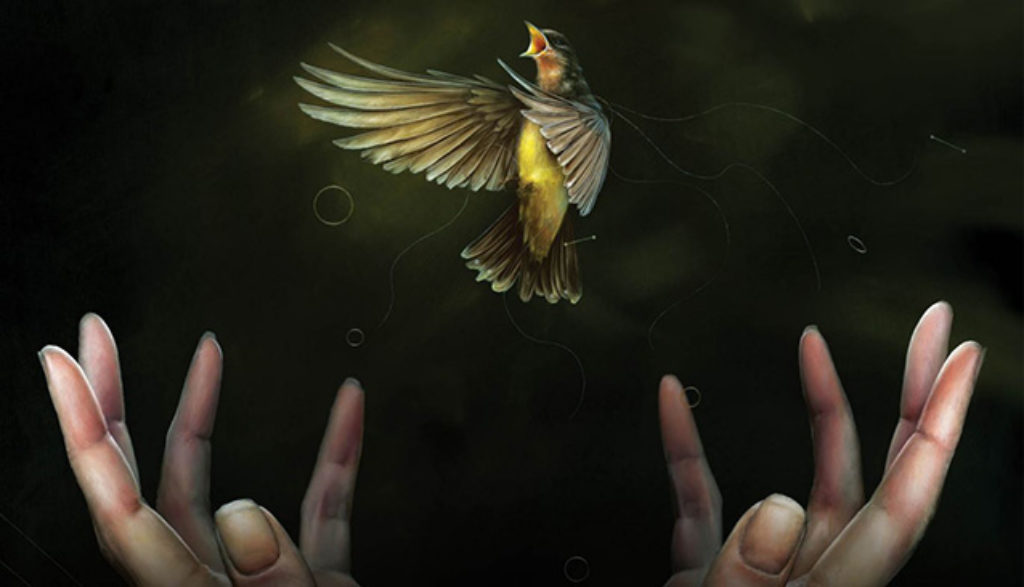
Imagine Dragons stormed out of Las Vegas in 2012 with the multiplatinum smash Night Visions, which featured the angst-ridden-yet-oddly-hopeful apocalyptic hit ” Radioactive.” The song’s stabbing synths fused of-the-moment EDM sounds with an unabashed arena-rock machismo that would have felt right at home in, say, 1988.
Now the band is back with sophomore effort Smoke + Mirrors, an album that’s widely anticipated to be one of the biggest of 2015. On it, Dan Reynolds and Co. swing for the fences with songs that appropriate a wide swath of contemporary and classic influences, sounding one moment like Coldplay or Muse, the next like the Bee Gees or Queen, or even Foster the People or the undisputed king of earnest stadium rock, U2.
And earnest this band is. The 13 songs on Smoke + Mirrors ache for salvation and spiritual clarity even as they nurse myriad doubts and fears. They match perfectly, actually, with what Reynolds recently told Billboard magazine about his Mormon faith: “I don’t necessarily agree with a lot of the culture that comes with it, but I still identify as Mormon. I like to think of myself as a spiritual person.”
The very first lyrics of album opener “Shots” apologize for some unspecified failure (“I’m sorry for everything/Oh, everything I’ve done”) before the song goes on to lament self-destructive tendencies (“From the second that I was born it seems I had a loaded gun/And then I shot, shot, shot a hole through everything I loved”). It ends with a plea for a second chance (“There’s always time to change your mind”).
That tenuous relationship between struggle and hope, belief and unbelief turns up again and again on Smoke + Mirrors. The title track tells us, “Believe/I want to believe/But all that I hope/Is it just smoke and mirrors?/ … I’m starting to cave/I’m losing my flame/I wanted your truth/But I wanted the pain to disappear/Dream maker, life taker/Open up my mind.” Similarly, “It Comes Back to You” shares, “4 a.m., beside myself/And what I think of mental health/All the things you don’t believe/I’ve been told just what to do/Where to look and point my view/All the things that I could be/I think I learned in therapy/ … It comes back to you, it comes back to you/All the things that you had lost will find their way back to you.”
On “I’m So Sorry,” Reynolds tries to make peace in fractured family relationships (“A son of a stepfather/A son of a/I’m so sorry”). That track affirms the importance of love, recognizes life’s disappointments and pledges to try harder. And ” I Bet My Life” finds Reynolds apologizing to his parents, saying, “I know I took the path that you would never want for me/ … Please forgive me for all I’ve done,” even as he salutes their deep influence on his life and values.
“Polaroid” contrasts feeling like a “reckless mistake” with a longing for cleansing and forgiveness. “Dream” delves once more into the jarring distance between our expectations in life and how things actually turn out. Gospel-eseque “Trouble” begs for friends’ prayers (“I keep trying to find me/So pray for me, brother/I need redemption/ … Pray for me, sister/Give me a mention/I got no faith”). Then the singer turns his attention elsewhere (upward?), saying, “Maybe you could save my soul/All of the things I don’t know.”
“Gold” expresses dismay at how receiving the “blessing of all that you’ve dreamed” makes it harder to know “who you can trust” because “now you can’t tell the false from the real.” Reynolds also says that having so much “gold” has ultimately left him feeling numb (“I’m dying to feel again/Oh, anything at all/But, oh, I feel nothin’, nothin’, nothin’, nothin'”). “Friction” encourages a friend to preserve instead of turning to drugs (“You can’t fight the friction/So ease it off/ … The tip of the needle/Is taking you over/And your heart is beating/’Cause you know that you gotta/Get out of the middle/And rise to the top now”). “Summer” counsels, “Fall in love with what you’re meant to be,” appropriating the metaphor of fire as a purifying element.
Again splitting the difference between doubt and the urge to keep believing, “The Fall” tells us, “Maybe I’m destined to be distraught/Always a reason/Breaking me down to my knees in the dead of night/I keep on praying to see the light.” And near the end we get this untargeted tribute: “You were the one/You were the one/You were the one/Who helped me see/ … Oh you gave it all to me.”
Sometimes the emptiness Dan Reynolds relates seems too deep escape. On “Hopeless Opus,” for instance,” he laments, “It’s not a picture-perfect life/ … I’ve got this place/That I’ve filled with empty space/Oh, I’m trying not to face what I’ve done/My hopeless opus.”
“I Bet My Life” contains the album’s sole profanity (“I gave you h— through all the years”).
The tension between failure and longing, not measuring up and yearning for something better, slippery unbelief and solid faithfulness shows up on virtually every song. But even though Imagine Dragons’ reflections simmer and churn with angst and ennui, there’s almost always a counterbalancing desire for some kind of redemption—whether that’s in relationships with other people or God. Hopelessness ultimately yields to Reynold’s aching determination to “keep on praying to see the light.” What we never get is a firm grip on exactly what kind of light we should be searching for as we slog our way down life’s muddy and bumpy path.


After serving as an associate editor at NavPress’ Discipleship Journal and consulting editor for Current Thoughts and Trends, Adam now oversees the editing and publishing of Plugged In’s reviews as the site’s director. He and his wife, Jennifer, have three children. In their free time, the Holzes enjoy playing games, a variety of musical instruments, swimming and … watching movies.